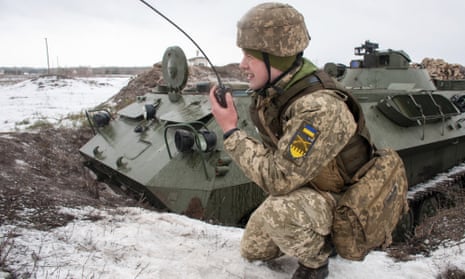Of all the great achievements of the 1945 Labour government, one stands out on the world stage. The NHS may have the greatest impact on our daily lives, but it is the creation of Nato that ushered in what is now approaching three-quarters of a century of peace between the nations of Europe.
Prime Minister Clement Attlee played a vital role in bringing together this unprecedented alliance of democracies. Then, as now, the promise that an attack on one member would be considered as an attack on all formed the foundation of British security policy. As such, Labour’s commitment to Nato is unshakable.
That commitment is more important than ever today.
The threat to Ukraine is real and pressing. More than 130,000 Russian troops menace its border. Russian combat battalions, tank divisions and air squadrons have massed, flaunting their capability of a full-scale invasion. For now, Putin’s final intentions are uncertain; the flexing and threatening of Russia’s destructive capacity are not. The prospect of a bloody and unjust war looms over Ukraine.
It was to prevent such needless wars that the generation of Attlee and his foreign secretary, the formidable trade union leader Ernest Bevin, were the midwives of Nato. With the failures of appeasement and the spectre of Munich fresh in their minds, they knew that the best way to preserve peace is to show that you are prepared to stand up to aggression. Indeed, on the day the treaty bringing Nato into being was signed, Bevin spoke of the new alliance as “a consecration of peace and resistance to aggression”.
Now, as the integrity of a sovereign nation on our continent of Europe stands in peril, those words are as sacrosanct as ever. That Bevinite internationalism will guide Labour’s approach to Britain’s security every day of my leadership.
Nobody wants war. At first glance, some on the left may be sympathetic to those siren voices who condemn Nato. But to condemn Nato is to condemn the guarantee of democracy and security it brings, and which our allies in eastern and central Europe are relying on, as the sabre-rattling from Moscow grows ever louder.
That’s why the likes of the Stop the War coalition are not benign voices for peace. At best they are naive; at worst they actively give succour to authoritarian leaders who directly threaten democracies. There is nothing progressive in showing solidarity with the aggressor when our allies need our solidarity and – crucially – our practical assistance, now more than ever. The kneejerk reflex, “Britain, Canada, the United States, France – wrong; their enemies – right”, is unthinking conservatism at its worst.
To truly stop war, you need to show you are serious about standing up for peace, that you are serious about keeping your promises to your friends, and that you will always stand up to those who threaten.
Another giant of the Labour movement, Denis Healey, as Labour’s international secretary in 1947, wrote the pamphlet Cards on the Table, which demolished the argument of those on the left that Britain could somehow be a third force, aligned neither with the Americans nor the Soviets. Attlee, Bevin and Healey saw communism for what it was, and were prepared to stand up to its aggression.
Today’s Labour party has the same clear-eyed view of the current regime in the Kremlin. We know, as they did, that bullies respect only strength. Russian tanks sit, engines revving, on the verge of annexing Ukraine, but protest placards waved here by the usual suspects condemn Nato, not Moscow. Any equating of the right of a sovereign nation to determine its own future, even to exist, and the vicious aggression of a neighbour is an intellectual sham. To do so is not merely misguided: it is morally wrong.
There is no equivalence between a defensive alliance that has never provoked conflict and those who would inflict the appalling cost of war on to others.
Moscow’s hard-line leadership won’t see a rally on the streets of Britain as a reason to pull its tanks from Ukraine’s borders. All it will see is naivety and weakness – virtue signallers in the west providing a smokescreen so it can go on beating up and jailing those brave individuals who dare to stand up to its despotism on the streets of Russia.
That is why I came to Nato headquarters to be briefed by its secretary general, the former Labour prime minister of Norway, Jens Stoltenberg, on how the alliance can stand together in the face of unnecessary threats from Moscow. And that is why Labour is standing by the UK government’s approach to standing united with our allies in the face of aggression abroad.
It is also why Labour is adamant that the government must do far more to stand up to the threat from the Russian regime at home. Under a decade of Conservative rule, London has become the home of international money laundering, where kleptocrats and criminals come to clean their dirty money of its stains.
This isn’t just an issue of financial crime, it’s an issue of national security. Dark money and influence leaves the mark of weakness and shame on our country, and it must be scrubbed clean. Labour strongly backs an economic crime bill to create a proper register of overseas entities in property and asset ownership, reform of Companies House to give it a regulatory function, and the rapid implementation of the sensible recommendations in the recent report on Russia by parliament’s intelligence and security committee.
By dragging its feet and refusing to take immediate action against dirty money at home, when it has the levers in its hands, the Johnson administration is weakening Britain’s moral and practical leadership abroad. We won’t let up in pressing it to end this prevarication.
When Bevin and the representatives of the other free nations designed the alliance one principle was paramount. No nation can be pressed into joining Nato, and no nation can be prevented from doing so by bullying and brinkmanship from others. Each new member joins for their own independent reasons, and each application is judged on its own merits by existing Nato members. That principle remains right and fair.
The pandemic has underlined again how today’s great challenges can only be tackled by action on a global scale. While they affect us individually, their very nature demands that they are solved collectively. We must be relentless in working together with our international partners to tackle global poverty, future health crises and climate change.
Nato is just one part of the rules-based international system that allows for collective action, but it is a vital one. It should be supported, and its resolve strengthened, not undermined by ill thought-out opposition. That is why Labour’s support for Nato remains as unwavering today as it was when we played an instrumental part in its formation. And that is why I regard both the Ns – Nato and the NHS – as legacies of that transformational Labour government that we need to be proud of and to protect.
Keir Starmer is leader of the Labour party and MP for Holborn and St Pancras

